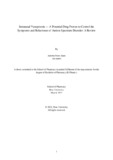Intranasal Vasopressin — a potential drug proven to control the symptoms and behaviours of autism spectrum disorder: a review

View/Open
Date
2022-03Publisher
Brac UniversityAuthor
Alam, Adeeba NoorMetadata
Show full item recordAbstract
"Autism spectrum disorder (ASD) is a neurodevelopmental disorder marked by impaired socio-emotional behaviours, communication, motor functions, hyper-fixation and sensory
overstimulation, and has received much attention since the last century with major technological advances and destigmatisation movements, yet its exact causes or treatment
remaining unclear. Currently, arginine vasopressin has been suggested as playing some
definitive role in causing ASD, and in this review work, the studies conducted to understand
its possible influence on appropriate social and cooperative behaviour and relevant literature has been included. These articles focused on the administration of arginine vasopressin (AVP) to animal and human participants and evaluated the effects of AVP in ASD core or associative symptoms using various outcome measure tests, such as Social Communication and Interaction (SCI), Social Responsiveness Scale (SRS), Restricted Interests and Repetitive Behaviour Scale (RRB), Facial Emotion Recognition Test (FERT), etc. and the research findings yielded favourable results for ASD patients. It was confirmed that vasopressin did indeed affect neural networks and AVP-administered groups had performed better than the control groups in ASD treatment drug trials, with minimal adverse effects and good tolerability and safety margin."
